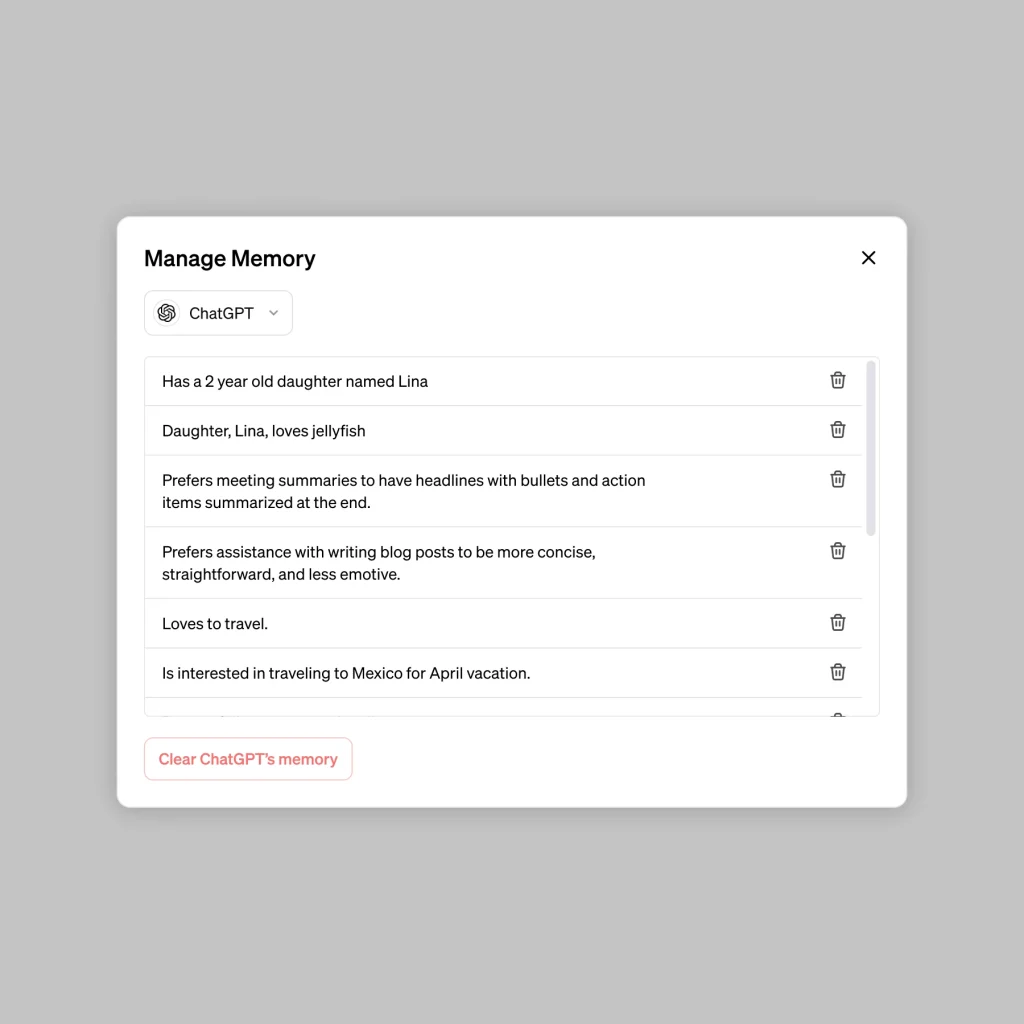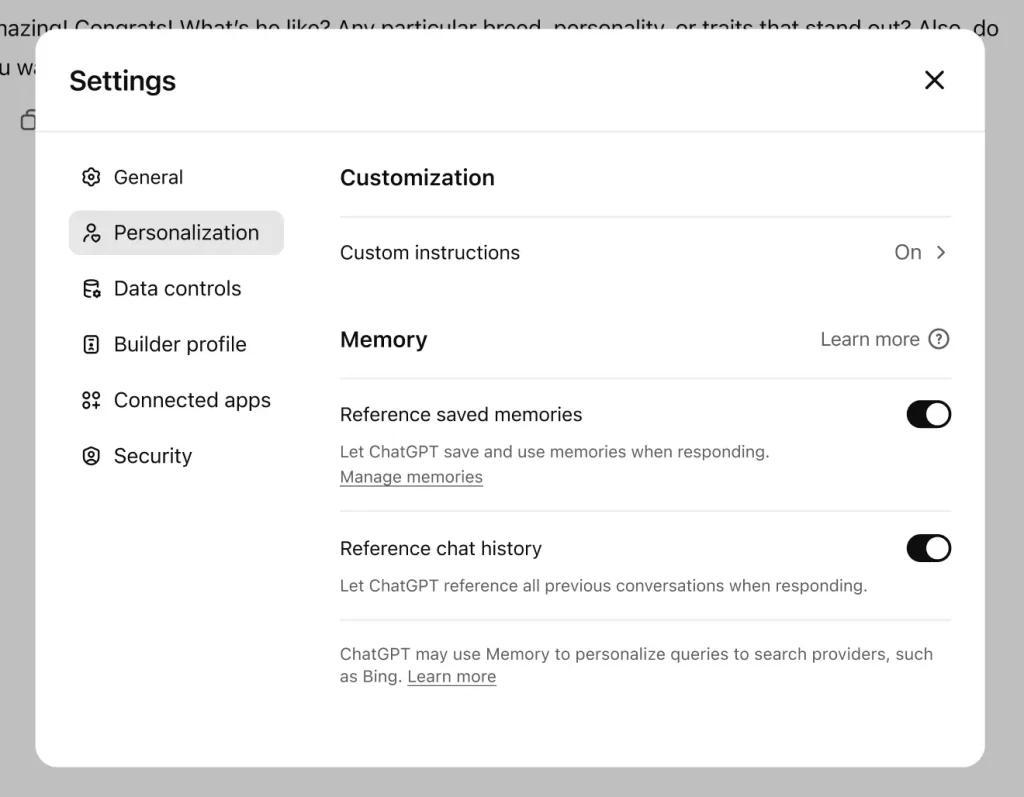Equinix to build £3.9bn Hertfordshire data centre
Equinix plans to invest £3.9 billion in the project, which will deliver 250+MW of compute

OpenAI’s memory upgrade for ChatGPT is a significant advancement that allows the AI to remember information across conversations, making interactions more relevant and tailored to individual users¹. Previously, each chat was treated as a standalone session, but with this update, ChatGPT can reference both “saved memories” (details you explicitly ask it to remember) and “chat history” (insights it gathers from past conversations) to inform future responses². For example, if you mention your dietary preferences or professional background in one conversation, ChatGPT can recall and use that information in subsequent chats without you repeating it².
This dual approach to memory is designed to streamline user experience, reduce repetitive exchanges, and build a more natural rapport between users and the AI¹². The introduction of this memory upgrade enhances the system’s ability to maintain context over extended interactions.
The memory upgrade operates in two main ways⁴:
Users are in complete control of what ChatGPT remembers. You can review, edit, or delete memories at any time through the settings or directly in conversation⁴. If you prefer not to have any conversations remembered, you can turn off the memory feature entirely or use “Temporary Chat” mode, which ensures that nothing from the session is stored or contributes to the AI’s memory³. This level of control is central to the feature’s design.

The memory upgrade brings several practical benefits to ChatGPT users⁵:
By allowing the AI to build on past conversations, the memory feature makes ChatGPT a more effective assistant for both personal and professional use. This memory upgrade transforms the interaction from a series of disconnected exchanges into a continuous dialogue⁴.
OpenAI has prioritized privacy and user autonomy in the design of the memory upgrade¹. Key privacy features include:
These controls are fundamental to addressing potential concerns about data retention and ensuring users have full agency over their personal information when using the memory upgrade⁸.
Implementing a reliable long-term memory in AI, like this memory upgrade, involves several technical hurdles¹:
OpenAI continuously works on refining these underlying processes, aiming to strike the right balance between providing rich contextual understanding, protecting user privacy, and maintaining system efficiency¹.
The memory upgrade is currently being rolled out globally, starting with ChatGPT Plus and Pro subscribers⁷. Access for Team, Enterprise, and Edu users is planned to follow shortly². Due to specific regulatory considerations, the feature is not initially available in certain regions, including the European Union, Switzerland, Norway, Liechtenstein, and Iceland⁴. OpenAI has indicated intentions to broaden the availability over time, potentially including users on the free tier in the future¹.
Users will typically be notified within the ChatGPT interface when the memory feature becomes active for their account. All memory settings are accessible and manageable directly through the application’s settings menu¹.
The new memory upgrade enhances ChatGPT’s utility across a wide spectrum of real-world scenarios⁵:
These diverse applications underscore the practical value and versatility that the memory upgrade brings to various personal and professional domains².
While the current memory upgrade represents a significant step forward, OpenAI is likely to continue refining and expanding its capabilities. Future developments might involve integrating memory more deeply with other features, such as real-time web browsing, to provide even more contextually relevant information⁶. As AI memory evolves, ongoing attention to transparency, user education, and robust security measures will remain crucial for maintaining user trust and ensuring the responsible deployment of technologies that handle personal data⁸.
OpenAI’s memory upgrade for ChatGPT marks a notable evolution in conversational AI, shifting interactions towards more personalized, efficient, and context-aware dialogues. By empowering the system to remember and intelligently reference past conversations-both through explicit user instruction and implicit learning from chat history-users gain a more capable and intuitive AI assistant. Critically, this advancement is coupled with strong user controls and a clear focus on privacy, ensuring that the significant benefits of persistent memory are delivered while respecting user autonomy and data security. This memory upgrade sets a new standard for how we might expect AI assistants to interact with us in the future.
Citations
Please note, that the author may have used some AI technology to create the content on this website. But please remember, this is a general disclaimer: the author can’t take the blame for any mistakes or missing info. All the content is aimed to be helpful and informative, but it’s provided ‘as is’ with no promises of being complete, accurate, or current. For more details and the full scope of this disclaimer, check out the disclaimer page on the website.
The post Understanding OpenAI’s ChatGPT Memory Upgrade: How AI Remembers Better Now appeared first on AI GPT Journal.
Author: Jim Malervy - This post was originally published on this siteEquinix plans to invest £3.9 billion in the project, which will deliver 250+MW of compute
Key takeaways What Is Imagine Lens—and Why It Matters Snapchat’s Imagine Lens lets us create…
Packages downloaded from NPM can fetch dependancies from untrusted sites.
Exclusive Edge, Atlas, Brave among those affected
A critical, currently unpatched bug
The announcement brings Amazon’s total pledged investment in South Korea to $9 billion over the